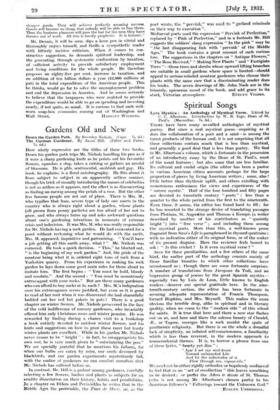Spiritual Songs
Lyra Mystics: An Anthology of Mystical Verse. Edited by C. C. Albertson. Introduction by W. R. Inge, Dean of St. Paul's. (Macmillan. 7s. fid.)
THERE have been many so-called anthologies of mystical poetry. But since a real mystical poem—requiring as it
does the collaboration of a poet and a saint—is among the rarest products of the human soul, it is not surprising that all these collections contain much that is less than mystical, and generally a good deal that is less than poetry. We find in Mr. Albertson's volume, which is fortunate in the possession of an introductory essay by the Dean of St. Paul's, most of the usual features ; but also some that are less familiar.
Its cultural and credal origin (the editor has been a pastor in various American cities) accounts perhaps for the large proportion of pieces by living American writers ; some, alas ! little better than rhythmic uplift, and others extolling with monotonous enthusiasm the views and experiences of the nature mystic." Half of the four hundred and fifty pages are devoted to twentieth century " poets " : less than a quarter to the whole period from the first to the nineteenth. Even these, it seems, the editor has found hard to fill ; for he has resorted to the strange device of translating passages from Plotinus, St. Augustine and Thomas a Kempis (a writer described by another of his contributors as quaintly
bright ") into " free verse " ; and including them among the mystical poets. More than this, a well-known prose fragment from Suso's Life is paraphrased in rhymed quatrains ;
with no indication either of its original form, or of the maker
of its present disguise. Here the reviewer feels bound to ask : "Is this cricket ? Is it even mystical verse ? "
Save for these peculiarities, and a few others of the same • kind, the earlier part of the anthology consists mainly of those familiar beauties to which other collections have accustomed us ; though there are some fortunate surprises. A number of translations from Jacopone da Todi, and an impressive group of poems by the great Spanish mystics-- especially two by Luis de Leon, little known to English readers—deserve our special gratitude here. In the nine- teenth-century section, the editor has been fortunate in securing adequate representation of Francis Thompson, Gerard Hopkins, and Mrs. Meynell. This makes the more obvious the terrible drop, alike in spiritual and in literary quality, when we come to the "modern side" of this school for saints. It is true that here and there a new star flashes
out on ua, and here and there the solemn beauty of Claudel, - IE., or Tagore, emerges like a rock amidst the spate of pantheistic religiosity. But there is on the whole a dreadful lack of simplicity, an inflated self-consciousness, a familiarity which is leis than reverent, in the modern approach to
transcendental themes. It is, to borrow a phrase from one of these lyrics, "'hearty yet dim" :
"Ajar I set my soul-doors
Toward unbounded Life And let the infinitudes of it Flow 'through me, vigour-rife."
We need not be either rigidly orthodox or hopelessly mediaeval to'feel that as an act of recollection "this leaves something
to he desired ; or prefer the Adore te devote of St. Thomas (Who is not among Mr.- Albertson's chosen poets) to his 'American-follower's Falterings toward the Unknown God."
• ' EVE-LYN Urfotnurt.L.






































 Previous page
Previous page